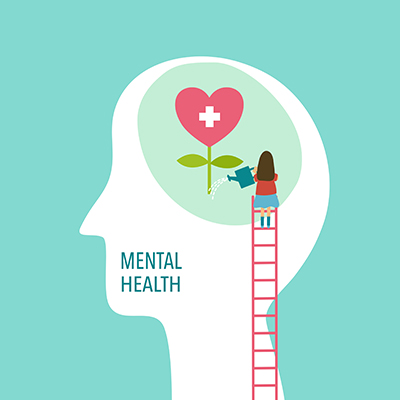Finding mental health care shouldn't be this difficult
Older adults in America are facing a mental health crisis due to lack of access to Medicare providers
Posted on January 16, 2022
 Anyone who has had the experience of trying to find a therapist — especially one covered by insurance — can attest it can be a soul-crushing exercise.
Anyone who has had the experience of trying to find a therapist — especially one covered by insurance — can attest it can be a soul-crushing exercise.
It can be even more soul crushing when you are trying to find mental health support that is culturally competent around race, sexual orientation or gender identity.
It’s hard enough to even seek out care when you are dealing with anxiety, depression or other mental health conditions (not to mention the ongoing societal stigma around mental health issues). Trying to navigate a complex and often frustratingly inadequate system can add to the despair.
Thinking about this problem always reminds me of a funny, wry scene from HBO’s “A Black Lady Sketch Show,” where the boyfriend of Ashley Nicole Black’s character orchestrates an elaborate engagement proposal for her. He gets down on one knee and says, “It’s a viral proposal! It’s what you always wanted!” And she replies, “No! What I always wanted was to find a Black lady therapist in-network, but I guess I dream too big.”
It’s funny because it’s true. Virtually every Facebook group I am part of that is for people of color or queer and trans people has post after post after post from people trying to find a therapist that actually meets them with all their intersecting identities. Many people, including me, already bitterly gave up on trying to have culturally competent therapy covered by their insurance.
According to reporting by Seattle Times Mental Health Project reporter Hannah Furfaro, only 12% of Washington residents live in a place where the public’s mental health needs can be met. And systemic barriers such as low reimbursement rates from insurance companies push providers into only accepting patients who can pay out of pocket, adding to equity gaps.
Access to mental health care
The Seattle Times’ Mental Health Project has been exploring issues of access to mental health care. This week, a series of stories will take a deeper look at why it’s so hard to get help when you need it.
Sunday: It’ hard to find therapy, stories from readers
Tuesday: Guide: What to know when looking for therapy
Wednesday: How Washington’s approach to mental health has changed
A report from Mental Health America suggested that more than 50% of Washington adults with mental illness receive no treatment, Furfaro’s story said.
And the need is only growing. According to the Journal of the American Medical Association Network, the rate of adult depression tripled during the pandemic.
It wasn’t supposed to be this way. In 2008, Congress passed the Paul Wellstone and Pete Domenici Mental Health Parity and Addiction Equity Act. The parity law required insurers to pr0vide coverage for mental health care at a level equal to physical health. But as the National Alliance on Mental Illness points out, equal does not mean good coverage.
Worse, insurers often have “ghost networks” of psychiatrists, providers in name only, who are either not taking new patients, are retired or in some cases, dead. In one 2014 study, researchers were unable to make appointments with 74% of psychiatric providers on their list. In response to these barriers, California recently passed a law requiring insurers to reduce wait times for mental health care to no more than 10 days. Under the new law, insurers may finally be forced to step up their provider networks and more seriously look at how they are reimbursing care.
Washington State Rep. Tina Orwall, D-Des Moines, who has a background in social work, said the need for families is urgent. “I just talk to families and they have someone who’s suicidal and they’re told, ‘Well, its four to six weeks before you get an appointment.’ You can’t wait if you’re in that crisis,” Orwall said. “And so really having our partners on the private insurance side have mental health parity — that’s what we need.”
Part of the work of increasing access is decreasing stigma. While previous generations were not as open or comfortable addressing mental health issues, Generation Z is paving the way to more acceptance.
David Downing, the CEO of Youth Eastside Services, which serves the mental health needs of children and adolescents, said that even before the pandemic, the young people they worked with were already more conscious of mental health issues than older generations, and the greater awareness of the mental health effects related to the COVID-19 pandemic decreased the stigma even more.
“One of the things I really appreciate about young people is that they actually really understand the importance of mental health, and that it’s on par with physical health … far better than other generations,” Downing said. “So currently, our younger generation of kids are kind of the healthiest in that sense.”
That shift is desperately needed because, Downing said, even as Gen Z is more comfortable seeking care and talking about mental health, the rise of social media and its accompanying pressures for perfection have created unprecedented depression and anxiety for young people. That has led to a dangerous rise in deaths by suicide and drug overdoses among that generation, Downing said. Last week, U.S. Surgeon General Vivek Murthy issued a rare public health advisory on mental health challenges for youth.
If there can be one silver lining from this seemingly endless pandemic it could be that we finally begin to take mental health care seriously.
Accessible, culturally competent mental health care covered by insurance should be the standard — not the exception. Providers should be able to offer care from anywhere through telehealth, opening up more access to rural areas and making therapists of color more accessible. There should be penalties for insurers who are skirting the parity law with ghost networks of providers. The need is dire and we cannot afford to wait.
Mental Health Project Engagement Editor Michelle Baruchman contributed reporting for this column.
BY Naomi Ishisaka: nishisaka@seattletimes.com; on Twitter: @naomiishisaka. Naomi Ishisaka is The Seattle Times’ assistant managing editor for diversity, inclusion and staff development. Her column on race, culture, equity and social justice appears weekly on Mondays.
0----------------0
Use your mobile device to stay up-to-date with the latest news and trending stories, delivered to your inbox weekday mornings. Sign up for our Free MORNING BRIEF email newsletter now.
Visit ST.News/MorningBrief
The Seattle Times
RELATED: Medicare in desperate need of more mental health providers, who stand ready to help.
SEE ALSO:
More Mental Health Articles
Sexual Bias Articles
Race Relations Articles
How Drugs and Alcohol Affect the Brain and Body
WA. Counselor Directory: find a therapist near you
How helpful is this web page to you?
(and how can we can improve this page for you?)
not helpful
very helpful
Other Articles
Basic facts about mental health and treatment in Washington state
The Mental Health Project is a Seattle Times initiative focused on covering mental and behavioral health issues. It is funded by Ballmer Group, a national organization focused on economic mobility for childr... read more
Telemedicine is here to stay
It’s hard to imagine that the devastating pandemic we’re living through could possibly have a silver lining, but I think I’ve found one: telemedicine. Traditionally, health care has bee... read more
Two Research Reports: on Health Related Issues
Relationship between Sleep Quantity and the Risk of Dementia and Possible relationship between Use of NSAID Painkillers and Risk of Erectile Dysfunction (ED)
Less Sleep, higher dementia risk “Doctors have long known that dementia patients often suffer from insomnia. What hasn’t been clear is whether getting insufficient sleep is a symptom of... read more
Premarital Counseling and Marriage Education Workshops
Prevent Marriage Decay (Happily Ever After...?)
Dear Future Newlyweds, Congratulations on your plans to marry. I have a question for you! How would you like to ensure that your marriage gets off on the right foot? What if I told you that you cou... read more




